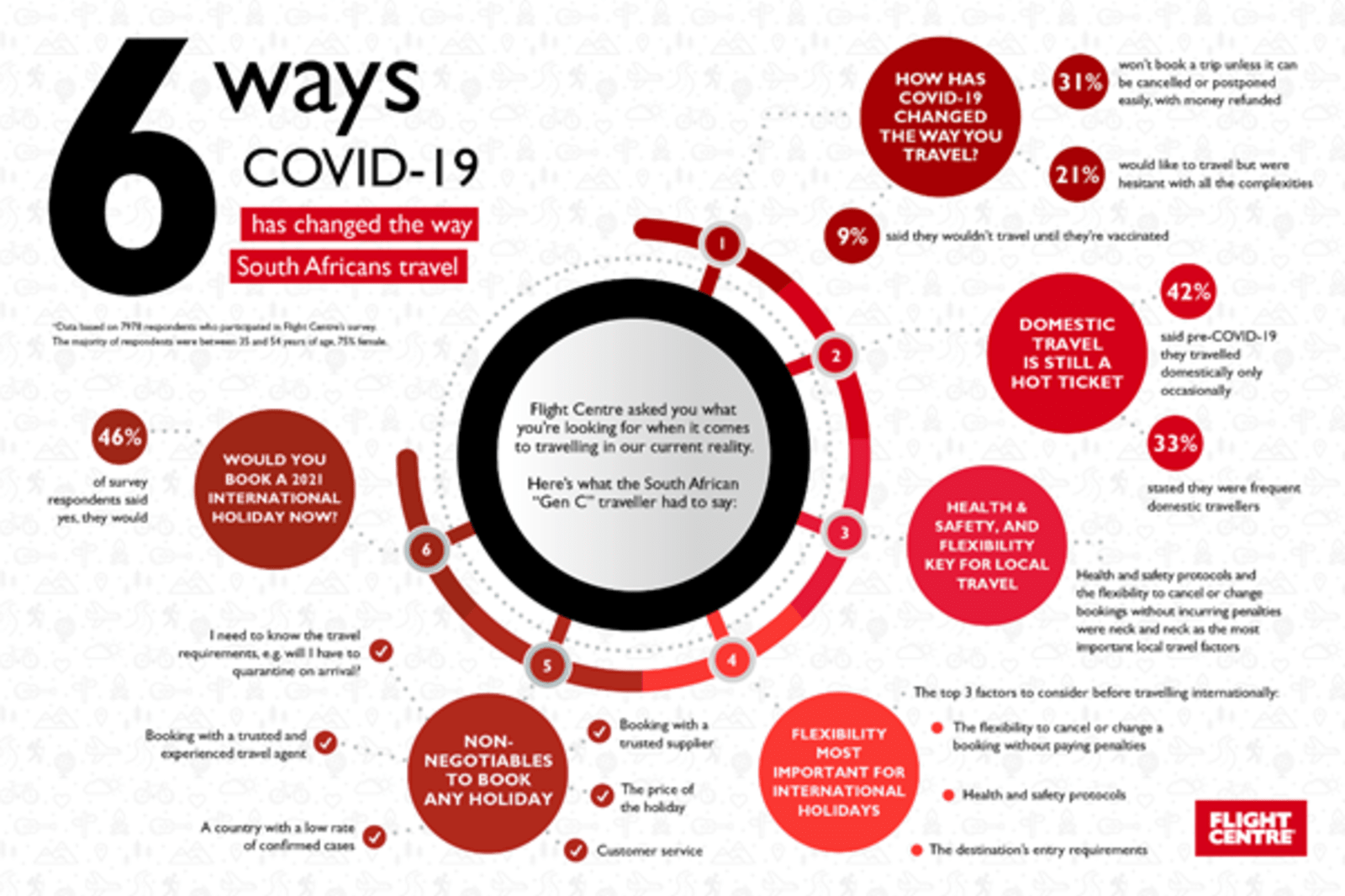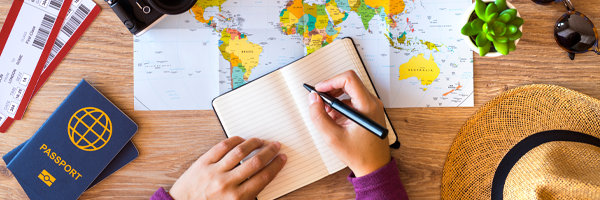
You’ve heard it; There’s nowhere we haven’t been.
So with that being said, we’ve spent a lot of time discovering and exploring new places, and we’ve definitely learnt our fair share of lessons. These lessons we share with each other and through the experiences of our very own travel experts. There have been so many travel stories to share like; the time Jodie was pick-pocketed on a train in Peru and when Scott arrived at Schiphol Airport to discover that his luggage had been delayed by three days and his car rental was bogus.
The Captain, together with a wide group of Flight Centre Travel Experts got together to swap stories and compile a list of their Top Travel Tips, to help other travellers to be prepared while on holiday.
Although you cannot plan for everything, some travel mishaps can be avoided.
Here is Captain Phil’s Top Travel Tips to help you save money, avoid mistakes, and when you are ready to travel again, you’ll travel like a pro!
Jot It All Down

About a week or so before each trip, start making mental lists of items you don’t want to forget. These items, you WILL forget if you don’t write them down. When you put it somewhere on paper you’ll be able to cross them off and feel much more relaxed when you get packing. There’s nothing more annoying than getting onto a plane and suddenly remembering you forgot to switch off the geyser or ask someone to feed the cat.
Patience is vital when travelling.
Be Flexible
When you know that travelling is an experience and not a hard and fast rule, you will enjoy your time better. Always plan for delays and try not to get upset when things inevitably go wrong. Sometimes, a delay in a flight or a cancelled tour could lead to other discoveries so try to be as open-minded and patient as you can.
You can never underestimate the importance of travel insurance.
Always Take Out Travel Insurance
We cannot stress this enough. We have had the unfortunate experience of seeing how this one thing can spell disaster for anyone travelling. Nomsa had a client who had to be airlifted on his honeymoon when he tried shellfish for the first time, not knowing that he was highly allergic. Without the correct travel insurance, his honeymoon quickly turned into a nightmare. A medical emergency can wipe out your savings, or even worse.
Learn A Few Common Phrases

When travelling to a country that does not speak your native tongue fluently, it helps tremendously to learn a few simple phrases like; “Please,” “Thank you,” “How much?” “Where is the restroom?” and “I’m sorry”. Locals appreciate the effort and you have gone to and will help you quicker if you at least try to communicate better with them. Our Travel Expert Michael found that this goes a long way together with the local word for beer.
Make Photocopies of Important Documents
Two travel experts were on their own honeymoon and left their passports in a taxi. You would think we are better travellers, but sometimes jetlag can get the better of us, too. This simple tip saved them a lot of time and frustration. Back in the hotel, they had put copies of their passports in the safe. Once it was scanned and emailed over to the consulate they were able to get emergency passports issued in time for their flight home. Always make copies of all your documents, passports, visas, tickets and travel insurance, and keep them somewhere separate. Check too, that your passport is not expiring within 6 months and you have at least three blank pages available.
Don’t Forget The Chargers and Batteries
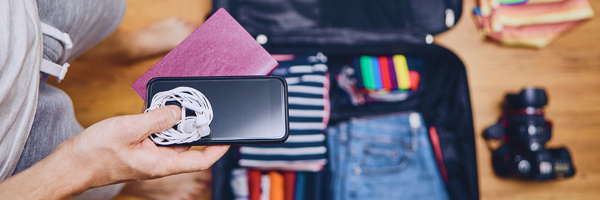
Making sure your camera battery is always charged and that you have a backup is something we often forget. If you are using GPS to navigate a dead mobile battery is not ideal either, getting lost in a foreign country when you cannot use Google Maps or Translate could see you stressed and Make sure you are well stocked with all your tech.
Always Bring A Wrap
Natalie from our head office always travels with a pashmina, oversized scarf or sarong. Her top tip is that it could be used in so many ways; as a wrap when you are cold, and added layer under the aeroplane banket, a towel, a curtain, or a piece of clothing that can be worn dozens of different ways. Her luggage was lost once and at least she had an extra item to wear. Since then, she never travels without it.
Always Pack The Night Before
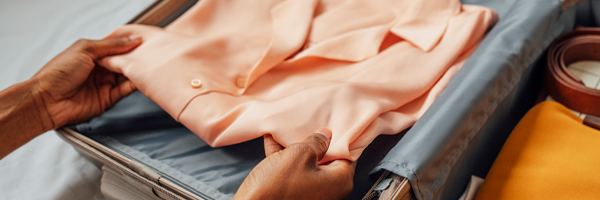
When you have an early day ahead and need to get to the airport in time, you don’t want to leave packing your bags until the morning. The flight time could change, there could be heavy traffic or you could even miss your wakeup call and oversleep. Rather make sure that your bags are packed and ready before you go to bed and avoid turning the morning into an episode of “The Amazing Race”.
Pre-plan Your Outfits
Write down how many days and nights you will be away and plan an outfit for each day. It may sound overkill but you’ll be surprised how often you forget your favourite pair of shorts behind if you don’t do this. Check the weather a day before and plan accordingly.
TOP TIP: Put Electronics, Your Toothbrush, Medications, and a change of undies in your carry-on bag. You can buy most of these things if your bag does, unfortunately, get lost, but having them in your carry-on will save you money and time if your luggage gets lost in transit. Your swimming cozzie is also a good idea if you are going on a beach break.
Stay Hydrated on Planes
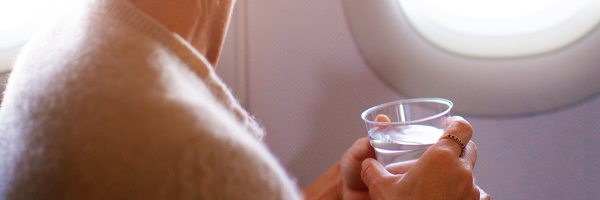
We know that part of the novelty of flying is sipping a good glass of vino with your airline meal, but it’s also much easier to get dehydrated at 30,000 feet. Always get a bottle of water and keep filling it up to keep your water levels up. Staying hydrated makes it much easier to get over jet lag.
Take Regular Walks And Circle Your Ankles
Getting up from your seat when it’s convenient for the airline staff is highly recommended. Walk up and down the aisle on long-haul flights and in your chair do some circular movement with your ankles to keep the blood pumping. Flight socks are a great investment that you’ll use a couple of times a year as they help tremendously with the swelling of your feet and ankles.
Put Your Room Number & Hotel Address in Your Phone
This really helps when you are not familiar yet with your surroundings and have checked in and want to head out and explore. It also helps with Uber and other transport and if you have a language barrier, taxi drivers will know when they see the address instead of you trying to tell them. Should an emergency happen, it will also aid those assisting you greatly.
Ask The Locals
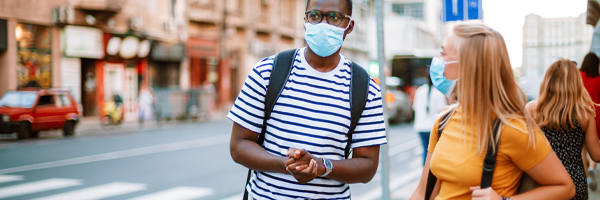
A great tip from one of our experts was Jackie’s; “always ask the locals to point us to the best restaurants, awesome spots to watch the sunset, the best coffee shops, markets and so on”. Rather get the inside scoop than trying to wing it. The locals know exactly where to go, so don’t be shy.
Beware of Free Public WIFI
Try not to log into bank accounts or enter any protected passwords while using free public WIFI at a place like an airport. Rather wait until you have gotten to your accommodation and check that it’s password-protected before compromising your cybersecurity.
Notify Your Bank of Your Travel Plans
Strange activity on your credit card will be flagged to your bank and they could put transactions on hold. This due to worldwide credit fraud and is in place to protect you. If you do not let your bank know, they will see it as suspicious, so get into the habit of letting them know. Not able to pay for your seafood buffet will be embarrassing and avoidable if you do.
Wear Sunscreen
Your skin is well adapted to your home town’s rays. But not to the rest of the world. Make sure you put on sunscreen each day, especially when you are travelling to protect your skin from the sun.
Be Spontaneous
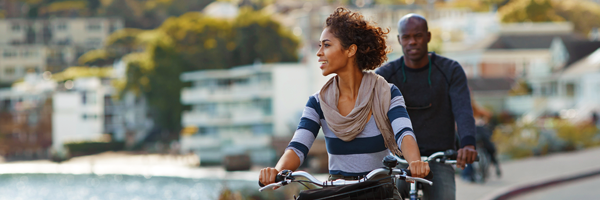
Don’t plan every single thing, every single day. It’s tempting, but we have realised that those unplanned moments while travelling can turn out to make the best memories.
Let Someone Know Your Plans
Always leave a list of the accommodations you’re staying at, flight details and itinerary with some at home. This is extremely important when travelling alone, but it’s still a good idea no matter how many people are in your travel group.
Separate Your Items
Courtney learned this the hard way and now she and her husband always mix their items into each checked bag. That way, should one of their bags get lost, they both still have some clothing and personal items.
Separate Your Sources of Money
Most accommodation comes with an in-room safe. Make sure to use it! Don’t keep all of your cash and cards in one spot and take only what you need at a time. Having all your cash and cards with you could really turn your trip upside down should your wallet get lost or stolen.
Travel First Aid Kit
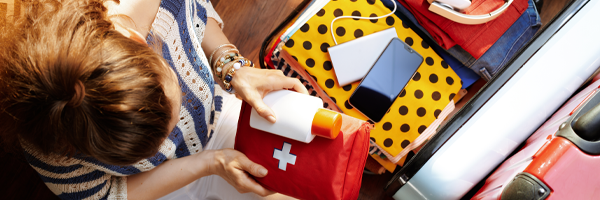
Pack a small first aid kit with headache tablets, anti-nausea, anti-diarrheal, plasters, antihistamines and cream for minor bites, cuts and bruises. Anything else you might think of you can add to the kit. Make sure you list it as one of the first things to pop into your travel bag when you start to pack.
On a final point, we suggest, keeping an open mind. Remember that you are only a visitor and you should always respect another country’s traditions and customs. It may be worth your while to read up before you go to familiarise yourself with the uniqueness of your destination. This way you won’t inadvertently offend anyone while visiting.
We hope you have enjoyed our list and got some tips for your next trip. When you are ready to see the world, contact your nearest Flight Centre to get the best, expert advice.
6 Ways COVID-19 has changed the way we travel:
